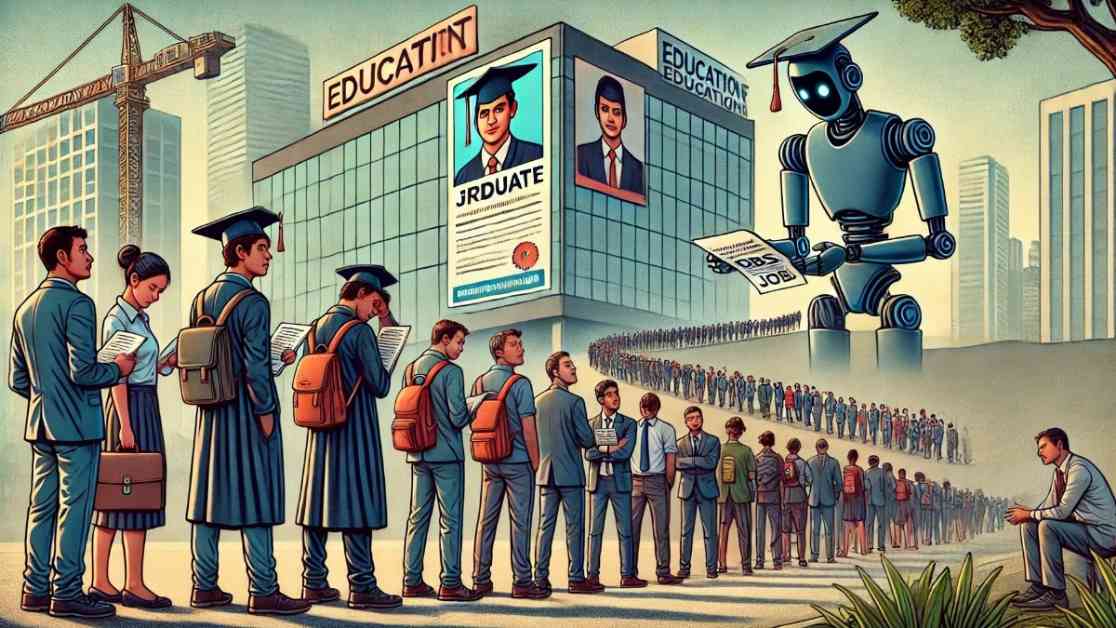Srinath Mallikarjunan, the CEO and Chief Scientist of Unmanned Dynamics, recently sounded the alarm on India’s growing job crisis, painting a stark picture of the country’s looming employment and employability challenges. In a thought-provoking post on LinkedIn, Mallikarjunan revealed the shocking reality faced by his company when they advertised two internship positions, only to receive a staggering 1,200 applications. Out of this massive pool of hopeful candidates, a mere 20 made it to the shortlist for further consideration.
The Cry for Change: Structural Flaws in India’s Education System
Delving deeper into the root causes of this concerning trend, Mallikarjunan highlighted several critical issues plaguing India’s education system. He pointed out that many students from prestigious institutions like the Indian Institutes of Technology (IITs) tend to coast through their studies after clearing the rigorous Joint Entrance Examination (JEE), leaving them ill-prepared for the demands of the real-world job market. Additionally, he criticized private colleges and universities for failing to deliver quality education, resulting in graduates who lack the necessary skills to compete in today’s competitive landscape.
One of the most troubling aspects brought to light by Mallikarjunan is the prevalence of first-generation graduates who obtain degrees without acquiring practical knowledge or skills. He emphasized that students are often misled by an outdated and ineffective educational system, characterized by obsolete syllabi, inadequate exams, and poorly trained teachers. This disconnect between academia and industry requirements has led to a scenario where millions of graduates are only suitable for low-skilled roles such as call center or clerical jobs—positions that are at risk of being replaced by artificial intelligence (AI) technologies in the near future.
The Call to Action: Empowering Students to Take Control of Their Learning
In response to these challenges, Mallikarjunan urged students to take ownership of their education and skill development. He recommended studying from internationally recognized textbooks, enrolling in online courses offered by platforms like NPTEL, and undertaking independent projects to gain hands-on experience. By proactively seeking out opportunities to enhance their practical skills, students can set themselves apart in a crowded job market and increase their employability prospects.
Mallikarjunan’s candid observations resonated with many professionals who shared his concerns about the current state of the job market and the lack of relevant skills among graduates. One user advocated for the introduction of vocational training in schools, underscoring the need for a shift towards skill-based education rather than a focus on certificates. Another highlighted the fierce competition for limited job openings, emphasizing the urgent need for quality employment opportunities to match the growing number of qualified candidates.
Dispelling Misconceptions: The Role of Startups and Investor Vision
In a bold rebuttal to the notion that startups could offer a quick fix to India’s education woes, Mallikarjunan drew a striking analogy, likening it to taking painkillers for a serious illness like cancer. He emphasized that the fundamental issues within the education system require comprehensive and sustainable solutions, rather than temporary patches.
Furthermore, Mallikarjunan critiqued Indian investors for their perceived lack of foresight and imagination. He criticized them for prioritizing short-term gains over long-term innovation, characterizing their investment strategies as akin to Ponzi schemes. He underscored the importance of supporting deep tech initiatives and fostering a culture of innovation to drive meaningful growth and progress in India’s evolving economy.
Reflecting on the personal experiences shared by individuals grappling with the challenges of finding meaningful employment in the face of technological disruptions, Mallikarjunan’s message serves as a poignant reminder of the urgent need for systemic change in India’s education and job sectors. As the country grapples with the realities of a shifting employment landscape, his call to action resonates with a sense of urgency and purpose, urging stakeholders to come together to address these complex issues and pave the way for a brighter future.























